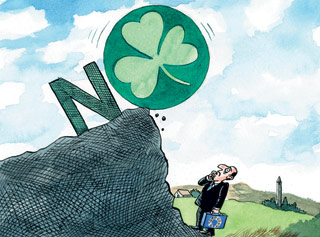Democrat June-July (Number 63)
Ireland - In the front line again

Despite clear legislation in the consolidated Treaty on European Union, a majority decision taken by the Irish electorate is being deliberately ignored. The Euro-federalists are forging ahead as though Ireland had ratified the Nice Treaty. Last year the Irish electorate rejected ratification of the Nice Treaty in a referendum in a clear result. According to clearly written EU legislation that should have been the end of Nice. Ratification of a Treaty requires all member states to ratify and if one fails for whatever reason the Treaty is dead.
Special declaration
At Seville, a special declaration was agreed to wrap the Nice Treaty in bright paper and present the same object to the Irish voters in a further referendum expected this October. The Irish Government are acting against the decision of their own people. Instead of saying to the rest of the EU member states the electorate has taken a decision and we will stand by this and will not arrange a second vote,. Irish ministers are incorrectly stating the EU will be in a severe crisis because there can be no expansion eastwards. Enlargement does not depend on the Nice Treaty the twelve applicant states can join under separate accession treaties just as Britain, Ireland and Denmark did in 1972.
Neutrality
Using the long held and deep concern for Irelands neutrality or independent foreign policy the Seville declaration says, "the Treaty on European Union does not impose any binding mutual defence commitments. Neither does it require Ireland, or any other Member State, to participate in the establishment of a European Army". In this way, Berthie Ahern is supposed to be able to sell the Nice Treaty in the second referendum. He is in for a hard sell and may come politically and legally unstuck in the process.
The basic reason for Ireland having a referendum on the Nice Treaty is because the Constitution has to be changed. The same thing happened in 1986 with the misnamed Treaty, the Single European Act. The Government was forced to hold a referendum and the Treaty was held up for six months. Since then there have been several battles over the conduct and funding of referenda and government expenditure on publicity. The government has come off the worst and those opposing the loss of Irelands independence have won.
Challenge in courts
According to the Peace and Neutrality Alliance (PANA) in Ireland the declaration has not really changed the content of the Nice Treaty, which would make the second referendum possible. PANA has made a court case against the Irish Government, accusing them of acting unconstitutionally because of the second referendum on the Treaty of Nice. "The Government asks the people to vote on the same Treaty again even though they have voted no and thereby made a final decision. The Government asks the people to make a final-final decision but it is thereby acting unconstitutionally", says Roger Cole, chairman of PANA.